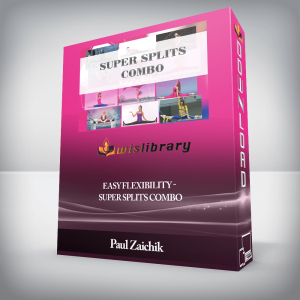18 Hours 55 MinutesWatch this breakthrough Cognitive Behavioral Therapy for Insomnia (CBT-I) Certificate Course to develop core competencies and master the art of applying CBT-I to a variety of clinical populations!Purchase 3-Day Certificate Course: Cognitive Behavioral Therapy for Insomnia (CBT-I): Evidence-based Insomnia Interventions for Trauma, Anxiety, Depression, Chronic Pain, TBI, Sleep Apnea and Nightmares – Meg Danforth , Colleen E. Carney courses at here with PRICE $499.99 $204Watch this breakthrough Cognitive Behavioral Therapy for Insomnia (CBT-I) Certificate Course to develop core competencies and master the art of applying CBT-I to a variety of clinical populations!You’ll get effective clinical techniques from two of today’s leading CBT-I treatment innovators, Colleen E. Carney, Ph.D. and Meg Danforth, Ph.D., who will share their insight and techniques. Join in for this revolutionary course as both reveal the latest advances in CBT-I to get the skills you need to succeed.You will be able to utilize concrete strategies that will provide greater healing for your clients who suffer from:AnxietyTraumaTBINightmaresDepressionChronic painSleep apneaDiscover evidence-based strategies to help your clients increase energy during the day, sleep more deeply, and re-initiate sleep after hot flashes, panic attacks or nightmares. The strategies that you will add to your toolbox can be easily integrated into existing treatment for depression, chronic pain, trauma and anxiety.Through case studies, interactive discussions, examples of sleep logs, and reproducible handouts, you will take away practical CBT-I strategies to use immediately with any client. Finish this certificate course armed with tools you can use in your very next session.Select assessment tools that screen for other sleep disorders and identify insomnia treatment targets as it relates to case conceptualization.Teach clients about the science of sleep and the causes of chronic insomnia for purposes of client psychoeducation.Ascertain key perpetuating factors for chronic insomnia to understand the etiology of chronic insomnia.Collaboratively design a sleep schedule with clients using a sleep diary to improve client’s sleep efficiency and daytime functioning.Combine stimulus control and sleep restriction therapy to address the three major causes of chronic insomnia.Select counter-arousal strategies to target hyper arousal in clients.Modify a client’s distorted beliefs about sleep using cognitive therapy techniques to improve adherence and decrease sleep related anxiety.Explore three models of CBT-I delivery and implementation issues for different practice settings.Select CBT-I treatment components to target perpetuating factors in clients with comorbid insomnia.Use cognitive and behavioral strategies to improve adherence with depressed clients.Modify treatment recommendations for clients who have symptoms of high sleep anxiety.Anticipate and resolve common treatment challenges in clients with PTSD such as sleep avoidance, fear of loss of vigilance and nightmare awakenings.Apply CBT-I techniques to clients with mild traumatic brain injury.Develop strategies to re-associate bed with sleep in clients with chronic pain.Combine CBT-I with a guided hypnotic taper to reduce rebound insomnia and psychological dependence in clients who wish to decrease or discontinue their use of sleep medication.Implement clinical treatment strategies to improve CPAP adherence in clients with co occurring obstructive sleep apnea.Combine behavioral interventions with evidence-based strategies, such as light therapy and strategically-timed melatonin, to “reset the clock” in clients with circadian rhythm sleep disorders.Use imagery rehearsal therapy to improve frequency and intensity of recurrent nightmares in clients with or without PTSD.Practice using advanced case formulation techniques to accurately select combination and order of CBT-I components.DAY 1: Assessment and the Basics of CBT-IAssessmentGoals of assessmentClinical tools for assessing insomniaScreen for other sleep disordersWhen to make a referral to a sleep clinicContraindications for CBT-ISleep and its RegulationNormal sleep architectureTwo-process model of sleep: Circadian rhythm and sleep driveThe arousal systemWhat causes chronic insomnia?Key perpetuating factors for chronic insomniaBehaviors that interfere with “buildup” of sleep driveBehaviors that interfere with the optimal timing of sleepConditioned arousal and physiological/ cognitive hyperarousalPerpetuating factors and CBT-IStep-by-Step Guide to CBT-I: Stimulus Control and Sleep Restriction TherapiesStimulus Control (SC): Addressing conditioned arousalRules for re-associating the bed with sleepIdentify and overcome potential obstacles to adherenceSleep Restriction Therapy (SRT): Restoring the sleep driveHow to present rationaleCalculate time-in-bed prescriptionPlacing the time-in-bed windowIdentify and overcome potential obstacles to adherenceSleep extensionCombining SC and SRTThe myth of sleep hygieneStep-by-Step Guide to CBT-I: Cognitive Therapy and Counter-arousalCounter-arousal strategies: Quieting an active mindEstablishing a buffer zoneProcessing strategies (including constructive worry and rumination strategies)Mindfulness and relaxation therapiesCognitive therapy: Identify and change distorted thoughts about sleepThought RecordsBehavioral ExperimentsSocratic QuestioningImplementation IssuesModels of DeliveryFour session individual therapy formatSeven session group therapy formatSingle session CBT-ICBT-I and hypnotic medicationPractice guidelines: CBT-I as first line treatment for chronic insomniaCombining CBT-I with sleep medicationPositive and negative effects of sleep medicationsUse of ineffective sleep medicationsPromote non-contingent use of sleep medicationStrategies to support hypnotic discontinuationDAY 2: Delivering CBT-I in the Context of ComorbiditiesDepressionCBT-I and MDDTroubleshooting adherence in depressed patientsAnhedoniaSleep or bed as avoidanceFatigue and fatigue management strategiesRumination in depressionCase examplesSleep and antidepressantsAnxietySleep effort: Core target of CBT-ICovert manifestations of sleep effortCognitive restructuring of sleep anxietyParadoxical IntentionTroubleshooting adherence with anxious clientsWhen SRT/SC increase anxietyCounter control and sleep compressionHigh sleep anxiety vs high arousalPanic Disorder and nocturnal panicOCD and CBT-ITraumaSleep and PTSDCBT-I trials in PTSDBehavioral targets in clients with insomnia vs PTSDCommon treatment challenges in clients with PTSDNightmares and nightmare treatmentsTraumatic Brain Injury (TBI)Comorbid TBISleep and TBIEfficacy of CBT-I in mild TBI (mTBI)Modify insomnia treatment for mTBIChronic PainEfficacy of CBT-I for those with chronic painChronic pain and stimulus controlCommon treatment challenges in clients with chronic painPain medications and other considerationsHypnotic DiscontinuationCombined guided hypnotic taper approachFactors sustaining hypnotic dependenceUnhelpful beliefsLearningStrategies to support client during hypnotic taperPsychoeducation about psychological dependence and rebound insomniaCognitive therapy to target unhelpful beliefsSample taper schedulesDAY 3: Co-Occurring Sleep Disorders and Advanced Case FormulationCo-Occurring Sleep ApneaObstructive sleep apnea (OSA)Morbidity and mortality of OSARelationship of nocturia and OSASleep apnea treatmentsObstacles to treatment adherencePhysical comfortMechanical problemsSocial and other factorsPsychological factorsImprove adherenceWork with stages of changeRespond to common concernsCPAP desensitization for claustrophobiaTreating insomnia in patients with comorbid OSACircadian Rhythm Sleep DisordersUsing light to leverage circadian timekeeper“Exogenous” circadian challengesCope with shift workAdjust to jet lag“Endogenous” circadian disorders: Advanced and delayed sleep phasePhototherapy for delayed sleep phaseImagery Rehearsal Therapy for NightmaresNightmares and nightmare disorderDifferential diagnosisAssessmentSelf-monitoring via nightmare logCombine nightmare log and sleep diaryImagery Rescripting and RehearsalPsychoeducation and rationaleNightmares and traumaShaping imagery skillsIRT stepsPrazosin for nightmaresAdvanced Case Formulation in CBT-ICase conceptualization: Asking the right questionsCase Formulation FormFactors weakening sleep driveFactors weakening the clockEvidence of hyperarousalUnhelpful sleep behaviorsComorbiditiesCase ExamplesTag: 3-Day Certificate Course: Cognitive Behavioral Therapy for Insomnia (CBT-I): Evidence-based Insomnia Interventions for Trauma, Anxiety, Depression, Chronic Pain, TBI, Sleep Apnea and Nightmares – Meg Danforth , Colleen E. Carney Review. 3-Day Certificate Course: Cognitive Behavioral Therapy for Insomnia (CBT-I): Evidence-based Insomnia Interventions for Trauma, Anxiety, Depression, Chronic Pain, TBI, Sleep Apnea and Nightmares – Meg Danforth , Colleen E. Carney download. 3-Day Certificate Course: Cognitive Behavioral Therapy for Insomnia (CBT-I): Evidence-based Insomnia Interventions for Trauma, Anxiety, Depression, Chronic Pain, TBI, Sleep Apnea and Nightmares – Meg Danforth , Colleen E. Carney discount.Purchase 3-Day Certificate Course: Cognitive Behavioral Therapy for Insomnia (CBT-I): Evidence-based Insomnia Interventions for Trauma, Anxiety, Depression, Chronic Pain, TBI, Sleep Apnea and Nightmares – Meg Danforth , Colleen E. Carney courses at here with PRICE $499.99 $204

 3-Day Intensive Clinical Orthopedic Certificate Course – Terry Rzepkowski
₹33,864.00
3-Day Intensive Clinical Orthopedic Certificate Course – Terry Rzepkowski
₹33,864.00
 Timing Solution Advanced – 2010 Edition – Market Analysis
₹36,686.00
Timing Solution Advanced – 2010 Edition – Market Analysis
₹36,686.00
3-Day Certificate Course: Cognitive Behavioral Therapy for Insomnia (CBT-I): Evidence-based Insomnia Interventions for Trauma, Anxiety, Depression, Chronic Pain, TBI, Sleep Apnea and Nightmares – Meg Danforth , Colleen E. Carney
₹33,864.00



